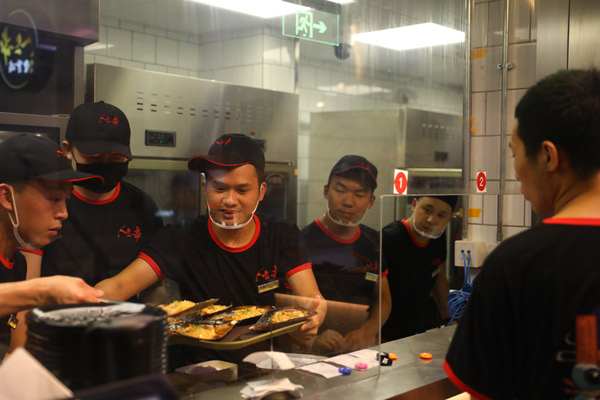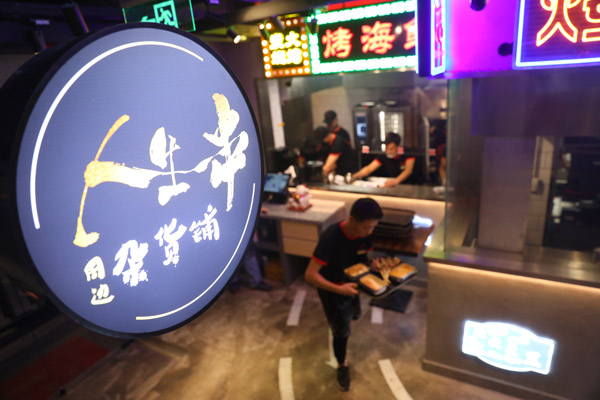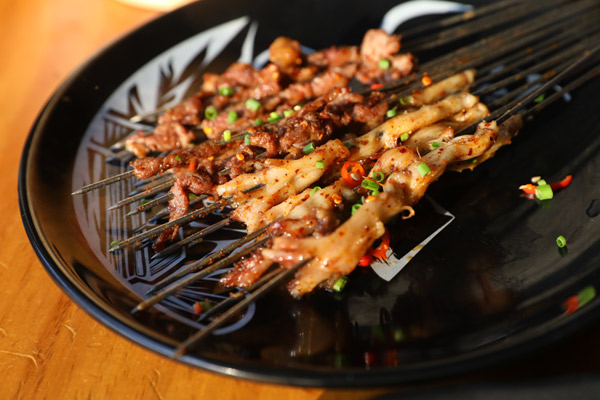
A customer enjoys skewers while staff members busily prepare food at the newly-opened The Story of Chuan'er, a Shanghai restaurant named after a popular six-episode food documentary, offering most of the items featured in the series. [Photo provided to China Daily]
A new skewer restaurant inspired by a hit food documentary proves that the way to people's hearts is truly through the stomach, Xu Junqian reports.
It is 3 pm on a weekday and most of the spaces at the Knowledge and Innovation Community commercial hub in the northwest of Shanghai are devoid of people.
Given that it's the summer holidays, even the restaurants, cafes and nail salons along the community's main street, which are normally filled with students, have fallen silent as well.
Yet, one sign of life in this area is at a new restaurant called The Story of Chuan'er.
Since opening on Aug 17, the two-floor restaurant has been drawing hordes of foodies, and the queues only seem to get longer by the day. The restaurant opens for business at 5 pm, but the queue outside stretches around two blocks from as early as noon.
The restaurant is inspired by a massively popular six-episode food documentary of the same name that premiered last summer. Created by a production team based in Shanghai, the show was an immediate hit with audiences, setting a viewership record with an audience of more than 52 million, according to Bilibili, the online video platform where the show is hosted. Bilibili is a well-known streaming platform among teenagers due to its extensive collection of animations.

[Photo provided to China Daily]
Sun Yang, the investor and owner behind the Shanghai eatery, was just one of the viewers who was enthralled by what he saw.
The 29-year-old restaurateur, who runs several bars and cafes in the city, says he stumbled upon the show while browsing through the site that his son often visits. After just one episode, Sun was hooked-finishing the entire series that same night.
"For me, the part I can identify with the most is not the food, but the people around the food-the patrons, the cooks and the owners," says Sun, who worked in the television industry for several years before making the switch to the food and beverage sector.
Sun, who has always enjoyed skewered food since he was a child, then decided to expand his business portfolio with a restaurant that sold his favorite foods, with the main selling point being that his establishment would offer most of the items featured in the documentary.
"Although the people in the northern and southern parts of China have very different cuisines and eating habits, everyone has skewers for a late-night supper in China. It is so embedded in our culture that everyone has at least one or two stories related to skewered food," he says.
To prepare for the opening of the new restaurant, Sun spent the past year traveling with a chef to each of the 27 places featured in the documentary. All the skewers sold in his restaurant are created based on the dishes shown in the series. They include grilled lamb on red willow branch from Xinjiang Uygur autonomous region, chicken's feet, and even pig's eyeballs and nasal muscles.

[Photo provided to China Daily]
Sun admits that he also spent a significant amount of time convincing the executives of the production team to issue him a license to become the documentary's official outlet. He reveals that he spent 5 million yuan ($697,621), which is inclusive of the licensing fee, to set up the 160-square-meter store that can accommodate 140 seats.
Sun estimates that 80 percent of his customers are die-hard fans of the documentary. Li Yiren, a 19-year-old college student, is one of them.
"This is the first time that I've spent so much time queuing to eat at a restaurant," says Li.
"Me being here is just like a person craving a trip to Disneyland after watching Disney cartoons. I am demonstrating my support for the documentary by patronizing this shop," she adds.
Accompanied by her mother, who took a day off especially for the meal, Li says this was their second attempt at dining at the restaurant. The first time they came was on the opening day during dinner hours. They were told that the number of people waiting in line then had already outnumbered the total capacity the restaurant could accommodate before it closed at 3 am the following day.
Having watched the documentary three times, Li says the show not only whetted her appetite for the skewers, but also helped her to empathize with the roadside vendors who sell this food.
Her thoughts were shared by those from the production team.
Chen Yingjie, the director of the show, notes in one of his public speeches that the purpose of the documentary was not just to show how tantalizing grilled food is. He also hoped the audience, especially those from the younger generation, would be encouraged to take their eyes off their mobile devices and observe the life of others around them.

[Photo provided to China Daily]
Skewers, or grilled food, makes up the second-largest food category after hot pot, according to Dianping, the country's largest directory for restaurants. In 2018, there were more than 290,000 skewer joints in the country that were listed on the site.
Research from Dianping shows that more than 80 percent of skewer outlets are family-owned businesses, and 70 percent of them do not survive for more than a year due to problems such as market saturation, the rising cost of ingredients and labor, and local government efforts to clean up roadside stalls due to hygiene concerns.
According to Chen, of the 500 or so skewer places they scouted, around half of them had closed within a year.
"This is a really special group of people. The people selling skewers are so ubiquitous, yet so invisible. Therefore, if you tell their stories in the right way, it can somehow manage to resonate with a massive section of society, if not the entire nation," says Chen.
Sun, who reveals that he is already looking to open a second outlet, says that he wants to change people's perceptions of skewered food.
"The documentary could be a breakthrough for the industry in terms of undergoing an upgrade. Skewer joints can be turned into venues like bars, where people go to unwind after a long day at work or a miserable breakup, or just for a celebration," he says.
Statistics seem to back Sun's approach. According to a national survey carried out by listings website Koubei, skewers were found to be the most popular food category for those born in the 1990s, and the second-most popular for those born in the 1980s.
"People don't walk into a restaurant just because they are hungry. They are after an experience," Sun adds.
"As the catering business becomes more and more competitive, we need to appeal to diners in a variety of ways. The unique vibe that skewer restaurants offer could be one of them."

